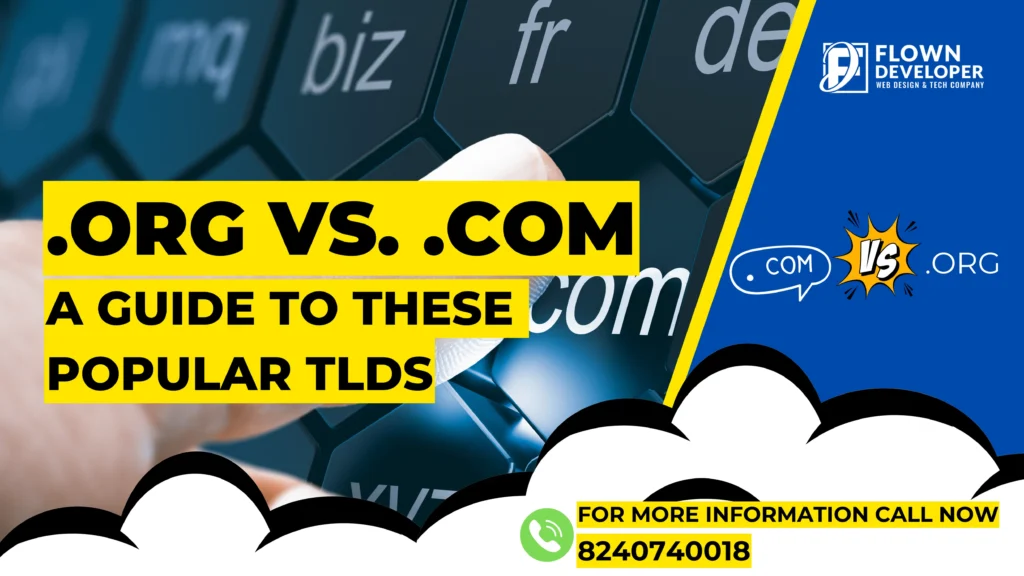Introduction: Decoding .org and .com Domain Extensions
In the vast landscape of the internet, domain names are the digital addresses that guide users to websites. These addresses often end with domain extensions, commonly known as top-level domains (TLDs). Two of the most recognized and widely used TLDs are .org and .com. This comprehensive guide will delve into the nuances of these popular TLDs and help you understand the distinctions between them. Whether you’re a business owner, blogger, or just a curious netizen, understanding the implications of choosing between .org and .com can significantly impact your online presence.
Unveiling the Power of .org TLD
Defining.org: The Purposeful Extension
The .org TLD is an abbreviation for “organization.” Historically, it was intended to signify nonprofit entities, NGOs, and charitable organizations. Websites ending with .org were instantly associated with a sense of purpose, transparency, and altruism. Although .org domains were initially reserved for nonprofit ventures, the scope has expanded. Various types of entities, including educational institutions, open-source projects, and communities, can also utilize this extension.
The Strengths of .org: Trust and Credibility
Choosing a .org domain for your website can offer distinct advantages. The extension has built a reputation for trustworthiness and credibility due to its historical connection with nonprofit endeavors. Visitors often perceive .org websites as reliable sources of information, making them an ideal choice for educational platforms, research centers, and advocacy groups.
Ideal Use Cases for .org
Nonprofits and Charities: As the original target audience, nonprofit organizations, and charities can benefit from the .org extension by communicating their philanthropic efforts effectively.
Educational Institutions: Universities, schools, and online learning platforms can leverage the credibility of .org to attract students and establish a scholarly digital presence.
Open-Source Projects: Communities working on open-source software or collaborative initiatives can use .org domains to foster collaboration and transparency.
The Influence of .com: Empowering Commercial Ventures
Decoding.com: The Commercial Identity
When the internet was in its infancy, the .com TLD, short for “commercial,” was one of the original TLDs. It was primarily intended for businesses, commercial ventures, and for-profit entities. Over time, the .com extension gained immense popularity and universal recognition, making it synonymous with online commerce.
The Power of .com: Global Reach and Recognition
Choosing a .com domain offers a multitude of advantages. To begin with, .com enjoys global recognition, enhancing user recollection and the discoverability of your website. This global familiarity can be a significant advantage, especially for startups and businesses seeking international audiences. Additionally, the .com TLD exudes professionalism, which can positively impact visitors’ perceptions of your brand.
Ideal Use Cases for .com
E-Commerce Platforms: Online stores, retail brands, and businesses engaged in electronic commerce can enhance their credibility by using the .com extension, a symbol of commercial legitimacy.
Startups and Corporations: For startups aiming to make a solid first impression and corporations looking to reinforce their brand identity, .com domains are the go-to choice.
Service Providers: Professionals offering services, such as consulting, freelancing, or creative work, can solidify their online presence and attract potential clients with a .com domain.
Choosing Between .org and .com: Factors to Consider
Audience Perception
Take into account the kind of audience you intend to appeal to. If you are running a nonprofit organization, an educational institution, or a community project, a .org domain might align better with your mission. On the other hand, if you are in the business sector, a .com domain can convey your commercial intent.
Brand Identity
Your domain name is an essential component of your brand identity. Think about the impression you want to leave on your visitors. A .org domain emphasizes purpose and goodwill, while a .com domain emphasizes professionalism and commercial prowess.
Global Reach
If your aspirations extend beyond regional boundaries, a .com domain might be more suitable. Its universal recognition can help you connect with a diverse audience from various parts of the world.
Making a choice: Which TLD Suits You Best?
Domain Name Availability
Before coming to a final decision, it’s vital to confirm the availability of your favored domain name using both .org and .com extensions. Domain names are unique; while one extension might be available, the other might not. Consider alternatives or variations that align with your brand if your preferred domain name is already taken.
SEO Considerations
Search engine optimization (SEO) drives organic traffic to your website. While both .org and .com domains can achieve strong SEO rankings, it’s essential to remember that the content and structure of your website have a more significant impact. Focus on producing high-quality, relevant content that resonates with your audience.
Trust and Authority
The choice of TLD can influence how users perceive your website’s trustworthiness and authority. While .org holds historical credibility in the nonprofit and educational sectors, .com is synonymous with established commercial ventures. Visitors might subconsciously form opinions about your website based on its domain extension, so ensure that your content and design uphold the image you want to portray.
Redirects and Brand Consistency
Sometimes, your preferred domain name is taken with one extension but available with another. Consider using redirects to guide users from one domain to another in such situations. However, be cautious with this approach, as it can impact your website’s SEO and user experience. Brand consistency is vital, so choose a domain that aligns with your branding strategy.
Conclusion: Your Digital Identity, Your Choice
Within the constantly changing digital environment, your website’s domain name holds significance beyond being a mere address; it embodies your digital identity.
The decision between a .org and a .com TLD should be driven by your objectives, values, and the image you want to project to the world.
Ultimately, there is no one-size-fits-all answer. The right choice depends on your organization’s mission, business goals, and target audience. Whether you opt for the purposeful .org extension or the globally recognized .com extension, remember that your website reflects you.
As you embark on this journey, remember that the internet is dynamic. Trends, perceptions, and user behaviors evolve. What remains constant is your ability to adapt and thrive in this digital universe. Choose your TLD thoughtfully, build your online presence strategically, and watch as your website becomes a digital destination that leaves a lasting impression.









